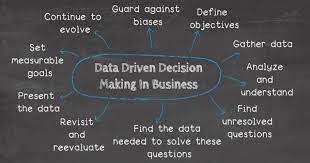Data and Decision making
Data undoubtedly is a key ingredient. Of course, it can’t just be any data; it has to be the right data. The dataset has to be relevant to the question at hand. It also has to be timely, accurate, clean, unbiased; and perhaps most importantly, it has to be trustworthy.
What does "Data-Driven mean?
Data-drivenness is about building tools, abilities, and, most crucially, a culture that acts on data.
Data-driven decision-making (sometimes abbreviated as DDDM) is the process of using data to inform your decision-making process and validate a course of action before committing to it.
In business, this is seen in many forms. For example, a company might:


When a Company Employs data driven approach, it means it makes strategic decisions based on data analysis and interpretation.A data driven approach enables companies to examine and organize their data with the goal of better serving their customers and consumers. By usig data to drive its actions, an organization can contextualize and/or personalise its messaging to its prospects and customers for a more customer-centric aproach
Benefits of Data-driven decision making
You’ll Make More Confident Decisions
Once you begin collecting and analyzing data, you’re likely to find that it’s easier to reach a confident decision about virtually any business challenge, whether you’re deciding to launch or discontinue a product, adjust your marketing message, branch into a new market, or something else entirely.
Data performs multiple roles. On the one hand, it serves to benchmark what currently exists, which allows you to better understand the impact that any decision you make will have on your business.
Beyond this, data is logical and concrete in a way that gut instinct and intuition simply aren’t. By removing the subjective elements from your business decisions, you can instill confidence in yourself and your company as a whole. This confidence allows your organization to commit fully to a particular vision or strategy without being overly concerned that the wrong decision has been made.
Just because a decision is based on data doesn’t mean it will always be correct. While the data might show a particular pattern or suggest a certain outcome, if the data collection process or interpretation is flawed, then any decision based on the data would be inaccurate. This is why the impact of every business decision should be regularly measured and monitored.
You’ll Become More Proactive
When you first implement a data-driven decision-making process, it’s likely to be reactionary in nature. The data tells a story, which you and your organization must then react to.
While this is valuable in its own right, it’s not the only role that data and analysis can play within your business. Given enough practice and the right types and quantities of data, it’s possible to leverage it in a more proactive way—for example, by identifying business opportunities before your competition does, or by detecting threats before they grow too serious.
You Can Realize Cost Savings
There are many reasons a business might choose to invest in a big data initiative and aim to become more data-driven in its processes. According to a recent survey of Fortune 1,000 executives conducted by NewVantage Partners for the Harvard Business Review, these initiatives vary in their rates of success.One of the most impactful initiatives, according to the survey, is using data to decrease expenses. Of the organizations which began projects designed to decrease expenses, more than 49 percent have seen value from their projects. Other initiatives have shown more mixed results.
"Big data is already being used to improve operational efficiency, and the ability to make informed decisions based on the very latest up-to-the-moment information is rapidly becoming the mainstream norm,” said HutTech Founder and C.E.O, Ian Okonu.
